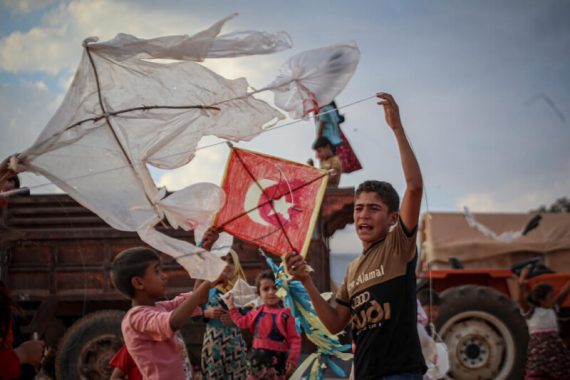F
or the last decade, the refugee issue is one of most important topics on the agenda of both voters and politicians in Turkey. With the upcoming elections, the refugee issue, especially in relation to Syrians, occupies an even more central place. The issue is closely related to the foreign policy and security approaches of the parties that make up the Nation Alliance. In the Memorandum of Understanding on Common Policies announced by the Nation Alliance on January 30, it states that arrangements will be made regarding the migration policies of Turkey including the refugee issue.
In the election campaigns of politicians of the Nation Alliance, the rhetoric about refugees, in general, and Syrian refugees, in particular, swings on a pendulum with populism at one end and welfare nationalism at the other. Syrians, who are referred to as “refugees” in this article stemming from the widespread use of the term in Turkey and who are under “temporary protection” due to their legal status, are the litmus test of the Nation Alliance’s democratic values, its adherence to international legal norms, and its ambiguous approach and policies towards terrorist organizations in Syria.
Hostility towards refugees and “Syriophobia” as an election strategy
In recent years, there has been a growing ruthlessness and hostility towards refugees in Turkey, as evidenced by public opinion surveys and academic studies. The two largest parties of the Nation Alliance, the Republican People’s Party (CHP) and the IYI Party, have been making harsh statements against refugees, transforming voter sentiment towards refugees into political capital under three headings: fear of demographic change, reduction of economic and employment shares, and security concerns.
For a while now, politicians from the CHP and the IYI Party have been openly claiming that Turkey’s demographics are changing. During his visit to Hatay on March 14, Kemal Kılıçdaroğlu, the opposition presidential candidate, stated that the Nation’s Alliance does not have any prejudice against any country, citizen, or foreigner, but they want to live freely in their own country and do not want the demographic structure of their country to change. On February 28, IYI Party’s chairman and chief advisor Turhan Çömez claimed that the places evacuated by earthquake victims were filled by Syrians, and “unfortunately” the demographic structure has changed in favor of Syrians.
Although there is a connection between these statements, the obvious purpose of the rhetoric is to incite hatred and anger among the public against the Turkish government and the country’s president. The Peoples’ Democratic Party (HDP) politicians, who are the secret partner of the Nation Alliance who claim to have an egalitarian and humane approach to refugees, have also been asserting the so-called deliberate demographic change for some time now.
However, this is an empty claim if we look at southeastern Anatolia where HDP is politically active and its politicians make provocative statements about Syrian refugees. In a sense, The propaganda of “Syrians are everywhere” has become a form of phobia, a “Syriophobia,” and silence implies consent. It is safe to say that the other alliance partners, namely the Democracy and Progress Party (DEVA), Future Party, Felicity Party, and Democrat Party, agree with these sentiments.
When economic issues arise anywhere in the world, it is unfortunately common for refugees to be unjustly scapegoated. It is both easy and dangerous to mobilize the masses using economic motives, as anti-refugee political movements have done in Europe. Unfortunately, now, in Turkey, there is a political party—still in the periphery— that is doing just this. Opposition parties in Turkey have long voiced their concerns regarding the economic burden that Syrians have placed on the country. Although the contribution of Syrians to the Turkish economy is taken for granted, especially in the first years of migration to Turkey, the harsh criticism of the opposition parties about the economic consequences of the open-door policy was effective and resulted in the failure of qualified Syrian workforce to settle in Turkey and flee to the West.
Furthermore, opposition parties have combined the cost figures cited by government representatives in addressing the international community with other expenses, thereby inflating the numbers presented to the domestic public. They have propagated rumours that Syrians receive salaries, are given shopping discount cards, and are provided free in vitro fertilization treatments, among other claims. In specific, they have introduced welfare nationalism to the Turkish political life, censuring and condemning services provided to Syrians such as housing, health, education, and social protection.
This rhetoric, which emphasizes “our citizens,” targets not only the middle class but also the lower-middle and lower-class voters. Welfare nationalism, which aims to provoke the reaction of large segments of a society, also functions as an antidemocratic lever that closes the concept of “citizenship” and opens it only to certain groups.
The third pillar of the rhetoric used by the Nation Alliance to turn anti-refugee sentiment into political capital is security threats. The alleged security incidents caused by Syrians and the perceived threats to our “common culture” are exploited to exacerbate anxieties and fears among the electorate. However, academic studies have demonstrated that the involvement of Syrians in crime is lower than that of the general population. Yet, it is impossible to counter the cultural threat rhetoric with numbers and statistics. Such rhetoric, which revolves around the debate of Syrians’ “disintegration,” is intertwined with Arab, Middle Eastern, and even Muslim animosity.
Although Kılıçdaroğlu’s unfortunate “swamp” analogy, when he referred to the economic impact of the Syrian crisis on Turkey, seems to refer semantically only to a geographical area, namely the Middle East, it symbolically targets people, their beliefs, and their social lives. Meanwhile, Akşener, who espouses identity-based populism, places Syrian refugees, the same as of the rest of the political elites of the Turkish opposition, in the same category, as she calls for a referendum on their status.
The Nation Alliance’s migration and refugee policies
In the Memorandum of Understanding (MoU) on Common Policies of the Nation Alliance, “Migration and Refugee Policies” are discussed under the section titled “Foreign Policy, Defence, Security and Migration Policies” indicating a security-oriented approach. Evaluated alongside the rhetoric discussed above, it is quite clear that this security approach will not only be applied to those who will come to Turkey from abroad in the future, but also to refugees currently living in Turkey and those who intend to stay in Turkey permanently.
In general, the topics under the title “Immigration and Asylum Seeker Policies” are presented in a haphazard manner and are not sufficiently integrated with the other parts of the text. A closer look reveals that the review process, which is required due to the nature of migration management, is presented only as a promise. The Directorate General of Migration Management (DGMM) is the youngest bureaucratic institution in Turkey in terms of its date of establishment and the average age of its personnel. It has been building the country’s migration management almost from scratch since it was founded in 2014 and is involved in a dynamic renewal process.
The promise to review Law No. 6458 expressed in the Nation Alliance’s MoU is also quite vague. Again, the promise in the text that International Protection Status Determination Centres will be established is meaningless. Currently, international protection is given by the International Protection Units of the Provincial Directorates of Migration Management affiliated with the DGMM. Therefore, it is very difficult to understand the logic of wanting to remove international protection from the jurisdiction of the institution responsible for the country’s migration management.
Recommended
The Nation Alliance’s migration and refugee policies
In the Memorandum of Understanding (MoU) on Common Policies of the Nation Alliance, “Migration and Refugee Policies” are discussed under the section titled “Foreign Policy, Defence, Security and Migration Policies” indicating a security-oriented approach. Evaluated alongside the rhetoric discussed above, it is quite clear that this security approach will not only be applied to those who will come to Turkey from abroad in the future, but also to refugees currently living in Turkey and those who intend to stay in Turkey permanently.
In general, the topics under the title “Immigration and Asylum Seeker Policies” are presented in a haphazard manner and are not sufficiently integrated with the other parts of the text. A closer look reveals that the review process, which is required due to the nature of migration management, is presented only as a promise. The Directorate General of Migration Management (DGMM) is the youngest bureaucratic institution in Turkey in terms of its date of establishment and the average age of its personnel. It has been building the country’s migration management almost from scratch since it was founded in 2014 and is involved in a dynamic renewal process.
The promise to review Law No. 6458 expressed in the Nation Alliance’s MoU is also quite vague. Again, the promise in the text that International Protection Status Determination Centres will be established is meaningless. Currently, international protection is given by the International Protection Units of the Provincial Directorates of Migration Management affiliated with the DGMM. Therefore, it is very difficult to understand the logic of wanting to remove international protection from the jurisdiction of the institution responsible for the country’s migration management.
The questions the Nation Alliance needs to answer
“Syrians in Exile,” which plays an important role in the election campaign of the Nation Alliance, is perhaps the title that needs to be handled most carefully in the announced “Immigration and Refugee Policies.” However, there is no concrete and convincing promise in the MoU. The article stating that Syrians under temporary protection will be returned to their country “safely and following our domestic and international law” is hypothetical when evaluated together with the political statements on this issue.
It becomes rather clear that the Nation Alliance does not have a clear answer to the following questions: What will happen to the safe zones established by Turkey in Northern Syria? How much will the demands of the Syrian opposition be supported in the process of reconciliation with Assad? How will it be ensured that the returnees can trust Assad? What will be the response to the PKK’s Syrian extension, the PYD, and its affiliates, and how will the dangerous regional policies of the U.S. be countered?
The most concrete promise of migration management by the Turkish opposition is to increase the number and capacity of departing centres, which are understood to be related to irregular migrants. However, the promise of entering into Readmission Agreements with the countries that are the source of irregular migration ignores the inefficacy of such agreements in addressing irregular migration. Conversely, currently the Ministry of Interior in coordination with the Ministry of Foreign Affairs is carrying out an approach to solving the irregular migration problem at its source.
Therefore, the claim that “we will prioritize the control of mass migrations towards Turkey in the source country” is in contrast with the Nation Alliance leaders’ discourse regarding these regions. Similarly, some of the promises made in other clauses concern actions that are already being taken or are impossible to implement. For example, the promise to share the burden and responsibility with other countries to return Syrians and irregular migrants is not feasible.
In conclusion, the Migration and Refugee Policies of the Nation Alliance fail to present a feasible vision and contradict the rhetoric of the political party representatives within the Alliance. Most importantly, some of the actions that the Alliance claims it will take regarding Syrian refugees and irregular migration are already in place. In fact, the promise to apply measures restricting the rights of refugees and the services they receive, justifies the concerns and fears felt by Syrians under temporary protection status in Turkey about the prospect of the Nation Alliance’s potential rise to power.





